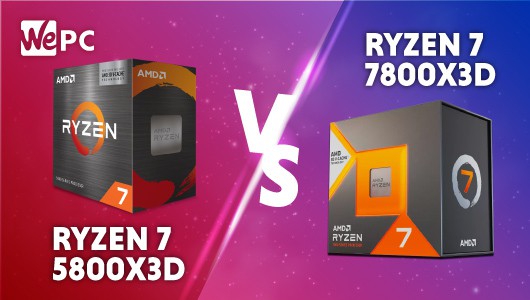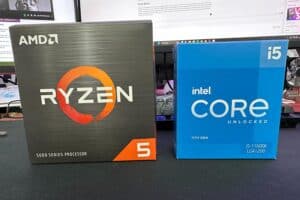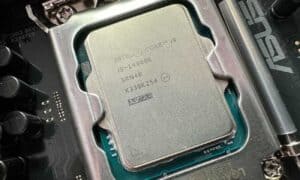AMD Ryzen 7 7800X3D vs Ryzen 7 5800X3D
It's probably the comparison we've been most excited to do since the announcement of the 7800X3D.

WePC is reader-supported. When you buy through links on our site, we may earn an affiliate commission. Prices subject to change. Learn more
AMD has finally announced the 7000 X3D series, it feels like it took them forever, as there are a lot of people excited about how much performance these CPUs hold. The 5800X3D once held the crown for “fastest gaming CPU” until the 12900KS came and took it away. We doubt AMD would let that happen again. But how does it compare to the 7800X3D? Here’s AMD Ryzen 7 7800X3D vs Ryzen 7 5800X3D.
Now read: Core i9-13900K vs 5800X3D
CPU speed isn’t everything, as we learned from the 5800X3D. Of course, it helps in other areas but it’s the CPU cache that matters most when gaming. but why is this? we’ll get to that later, but for now, let’s jump into the CPU specifications.
Update: AMD has announced the official release date of the Ryzen 7 7800X. It will be on April 6th, 2023.
7800X3D vs 5800X3D: CPU specifications
Here we will display both CPUs’ specifications and look at them comparatively.
Ryzen 7 7800X3D
- Architecture: Zen 4
- Core count: 8
- Thread count: 16
- Boost speed: 5.0GHz
- Cache: 104MB
- TDP 120W
The Ryzen 7 7800X3D is said to be one of the most efficient X3D CPUs on the market, offering the best price-to-performance ratio. This time, the X3D release includes a trio of processors, so that means the 7800X3D is not going to be the best performer. However, we still can’t wait to see what it can do.
Ryzen 7 5800X3D
- Architecture: Zen 3
- Core count: 8
- Thread count: 16
- Boost speed: 4.5GHz
- Cache: 96MB
- TDP 105W
Once crowned the “fastest gaming CPU” we have seen the 5800X3D overcome the toughest opponents in gaming. This includes the 5950X and the Core i9-12900K, formidable opponents. Yet the 5800X3D managed, thanks to its massive Cache.
With all that out of the way, we will compare a few specifications. for the sake of time and an easy read, we’re only going to mention the things that have changed.
AMD Ryzen 7 7800X3D vs Ryzen 7 5800X3D: Specification comparison
Here we will compare the specifications of the 7800X3D and the 5800X3D, and take a look at how they both stack up together. We’re only going to go over the things that have changed, for the sake of ease.
Architecture
There’s a lot changed when we compare Zen 3 vs Zen 4, that’s a whole topic for another day, but here’s the rundown.
The main difference between Zen 3 and Zen 4 is that Zen 4 uses a new 5nm process technology, which allows for smaller transistors and higher density. This lead to improved performance and energy efficiency. Additionally, Zen 4 brings further IPC (instructions per cycle) improvements over Zen 3. This means that not only is the Zen 4 core more efficient, but it’s more powerful too.
Core count
Both of our CPUs today have the same number of CPU cores and threads. however, the difference in microarchitecture means the cores inside the 7800X3D are much better.
More CPU cores mean better performance because they allow a processor to handle more tasks simultaneously. A core is the processing unit of a CPU and is responsible for executing instructions. The more cores a CPU has, the more instructions it can execute at the same time, which can lead to improved performance.
When a computer runs multiple applications or processes, the CPU can distribute the workload among its cores, allowing each core to work on a different task simultaneously. This is known as multithreading and it can greatly improve the performance of a computer.
Core speed
The 7800X3D has a much faster boost clock speed, meaning it’s going to perform better, considering it’s also on a better core architecture.
A CPUs core speed, also known as clock speed, is the rate at which a computer processor’s core completes a processing cycle in hertz (Hz). This is measured in gigahertz (GHz), with one GHz equaling one billion cycles per second. The faster the clock speed, the more cycles the processor can complete in a given time, which can lead to improved performance.
The clock speed of a processor is determined by the internal clock, which generates a series of pulses that synchronize the operations of the processor. The clock speed is set by the manufacturer and can often be adjusted by the user through the computer’s BIOS or UEFI settings. This is the core multiplier.
The faster the CPU can complete the instruction cycle, the faster the CPU can process. Speed is one of the most important factors when trying to measure a CPU’s performance. However, other factors such as the number of cores, the size of the cache, and the microarchitecture can also have a significant impact on performance.
TDP
The 5800X3D has a lesser TDP and that would be preferable, however, a higher TDP can sometimes be indicative of better performance. This is the case here, with the better Zen 4 cores.
TDP stands for Thermal Design Power, and it is a measure of the maximum amount of heat that a processor generates under normal operating conditions. It is specified by the manufacturer and measured in watts (W).
TDP is used to determine the cooling requirements for a processor, and it is an important factor to consider when building a computer or choosing a processor for a pre-built system. A processor with a high TDP will require more cooling than a processor with a lower TDP, so the cooling system must be able to handle the heat generated by the processor.
So it looks like the 7800X3D may require a beefier cooling solution than the 5800X3D.
Why is CPU cache important for gaming?
As we saw with all of the X3D models, the cache is the name of the game, but why? Why is CPU cache so important?
A CPU’s cache is important for gaming because it allows the CPU to quickly access frequently used data, which can improve the performance of the game. Games often have large and complex data sets, such as 3D models and textures, that the CPU needs to access quickly to render the game in real time.
By storing a small amount of this data in the cache, the CPU can access it much faster than if it had to retrieve it from the main memory. This can result in a smoother and more responsive gaming experience.
Ryzen 7 7800X3D vs Ryzen 7 5800X3D: Price
The price of something can massively impact whether or not you want to acquire something, obviously. So what are the prices of the CPUs in the articles today?
Truth is we don’t know what the price of the Ryzen 7 7800X3D is going to be just yet. But if the launch price of the 5800X3D is anything to go off, we expect the 7800X3D to start around $500 but expect it to punch well above its weight class in games.
The 5800X3D however, retailed at $449. However, the 5800X3D can now be found for anywhere between $300 and $370.
The 7800X3D is obviously going to be more expensive when it releases on February 14th, as it’s a better CPU.
Ryzen 7 7800X3D vs Ryzen 7 5800X3D: Conclusions
The AMD Ryzen 7 7800X3D is going to be a better processor, however, the cost is going to be astronomical if you’re still on the AM5 platform. The X3D CPU sets are all for gaming, there’s no point in picking these CPUs up for anything else.
So, if you’re a pure gamer with money to burn, head for the 7800X3D. Or, if you want to save a buck, and stay on AM4, you can go for the 5800X3D.
Do not purchase any of these CPUs for any kind of process-heavy, or multithreaded workloads. These are not the CPUs for you. We hope you enjoyed our AMD Ryzen 7 7800X3D vs Ryzen 7 5800X3D article.




